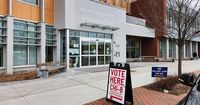As technology continues to evolve, local governments face the pressing question of how to integrate artificial intelligence (AI) into their operations effectively. In Vermont, South Burlington, the state’s second-largest city, is taking significant steps in this direction. The city is exploring the use of AI tools to streamline municipal processes, a move spearheaded by the IT director, Nick Gingrow, and the data manager, Anna Dabrowski.
According to a report by Liberty Darr published in the Other Paper on March 20, 2025, South Burlington is currently in the process of developing a comprehensive artificial intelligence policy. Gingrow stated, “We’re working on an AI policy so that we have good best practices set in place before people start using it to make sure that all of the city’s data — and (that of) everyone who lives in South Burlington — is used appropriately and safely before we start getting into utilizing it.”
The city’s commitment to AI is underscored by its participation in the GovAI Coalition, an initiative based in San Jose, California, which comprises municipal governments exploring the ethical and efficient use of AI. Notably, South Burlington is the only Vermont city or town in this coalition.
One of the primary tools under consideration is Microsoft’s Copilot, a software that integrates seamlessly with popular applications like Word, Excel, PowerPoint, Outlook, and Teams. On March 17, 2025, city staff gathered for their first training session on the capabilities of Copilot, focusing on practical applications such as taking meeting minutes and drafting bid proposal requests. Gingrow highlighted the time-saving potential of using AI for generating drafts, stating, “Creating (a request for proposals) from scratch can take a lot of work. So, if you could use AI to create a draft version based on three or four or five other RFPs you’ve done in the past, you could maybe get a draft version in minutes that might have taken you all day before.”
In addition to facilitating administrative tasks, AI could significantly enhance data analysis capabilities, as emphasized by Dabrowski. However, the draft policy mandates that city staff must review all AI-generated content to ensure its accuracy, affirming that AI tools are intended to enhance staff skills rather than replace them. “We want to be careful with how we’re using these tools as well and making sure that they’re working correctly for the kinds of things people want to be doing with their data,” Dabrowski remarked.
To test the viability of various AI applications, the city plans to roll out an internal pilot program. Dabrowski explained, “So, we’ll take those kinds of proposals, and then we’ll take a look and review those internally and say, ‘Okay, does this make sense for a pilot project?’” This initiative aims to obtain direct feedback from users to assess the practicality and effectiveness of AI tools.
Beyond improving internal operations, the city aims to enhance services for residents. For instance, the city’s website already utilizes an AI tool that allows for translation into various languages supported by Google Translate. Gingrow also mentioned the possibility of integrating a chatbot to improve website navigation, which would make information more accessible for all users. “It’s just making our information more accessible,” he noted.
Despite the enthusiasm for AI in South Burlington, neighboring town Shelburne is taking a more cautious approach. Town manager Matt Lawless mentioned that Shelburne is not planning significant AI projects currently, expressing skepticism about the technology’s broader implications. While some of their contract staff are using automated research assistants, Lawless argues that the greater challenge lies in maintaining human relationships within the community. “I think the greater governance challenge is one of human relationships,” he stated. “From Town Meeting Day to my open-door policy, building trust among neighbors is key to our success. I hate the idea of bots making complaints and bots answering them.”
Gingrow acknowledged the concerns surrounding AI’s impact on employment, admitting that like many technological advancements, there are fears that AI could threaten certain job functions. Nonetheless, he stressed that South Burlington’s focus is on utilizing AI to enhance efficiency and productivity. “If you can save two hours here or there by using this tool, it just gives you two hours to work on another project,” he explained, indicating a desire to shift resources toward tackling the city’s many ongoing projects.
In summary, South Burlington is positioning itself at the forefront of municipal AI integration, seeking to leverage technology to make government operations more efficient and accessible. With a carefully crafted policy and continuous assessment through pilot programs, the city aims to explore AI's potential responsibly while remaining mindful of the human element that it enhances.





